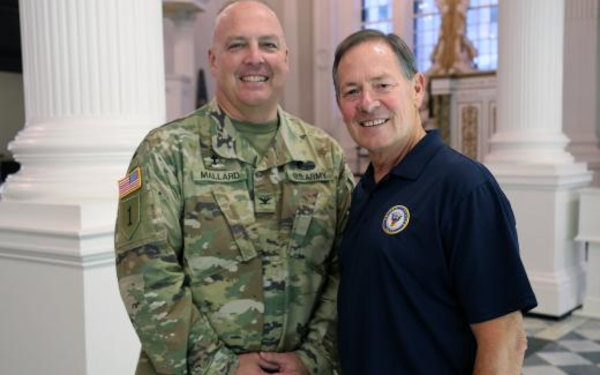Ann Curry and two Chaplains talk about meeting during a crucial time after the Pentagon attack on 9/11.
KATHY L. GILBERT
United Methodist News Service
In the midst of overwhelming grief, a Navy chaplain helped a young Army chaplain during one of the darkest hours of his life four days after the terrorist attack on the Pentagon.
But they didn’t meet until 16 years later.
Col. Timothy Mallard, an Army chaplain, never forgot that encounter and through the years searched for the man who stopped and prayed with him.
The search ended when he was asked to share his story on a PBS special, “We’ll Meet Again,” hosted by Ann Curry. The show producers found Capt. Doug Waite, a United Methodist and retired Navy chaplain, and brought the two men together.
The two chaplains will be featured in the episode, “Heroes of 9/11,” which airs Feb. 13.
Both chaplains were among the first on the ground at the Pentagon. Waite, a United Methodist elder, found Mallard, an elder in the Evangelical Presbyterian Church, overcome by grief. He stopped, then hugged and prayed with the younger man.
“The thing that made the most difference was when I looked up and saw his face, just the kindness and Christian compassion really touched me and encouraged me,” Mallard said. “I was able to go out and keep doing my ministry because of his ministry to me.”
Mallard never got Waite’s name but he remembered his face.
On 9/11, Waite was stationed in the office of the Deputy Chaplain of Coast Guard in Washington when he heard the plane hit the Pentagon. Mallard was assigned as a Department of the Army Intern in the Office of the Chief of Chaplains at the Pentagon.
Mallard was supposed to be on duty that morning in the wedge of the Pentagon that was hit.
“It was literally by divine occurrence that the night before, two of my three children got sick and at 3 a.m. my wife and I agreed I would stay home with them,” Mallard said. But he was close enough to also hear the plane hit the Pentagon.
A chaplain’s tent was erected 50 yards from the impact, Waite said. “The FBI was on one side and FEMA was on the other,” he said. Chaplains started immediately signing up to take different shifts at the tent.
“I was chaplain on the scene when we loaded the first 30 bodies on Chinook Helicopters to fly them to Dover. I prayed over them,” Waite said.
“The horror was going on all around us, I’m not even sure the fire had even gone out yet,” Waite recounted about when he encountered Mallard. “We found whole offices of people, dead at their chairs. That fire was like 2,000 degrees where the plane hit.”
Mallard couldn’t get to the Pentagon on Sept. 11 because of the traffic snarls in Washington. But he arrived the next day.
“All I did for days was walk around wearing my cross and people would walk up in pain, needing care,” Mallard said. Search and rescue teams first had to get the building stabilized before recovery could begin.
Mallard was working with one of those teams and on the morning of Sept. 15, they sent for him.
“I think some of them had hit a wall and they said, ‘Chaplain, we are not going in until you talk to us.’”
He started reading Psalm 23.
“When I got to the part where David says, ‘Yea, though I walk through the valley of the shadow of death …’ I looked to my right and my eyes welled up with tears. They started to cry,” Mallard said.
He continued to read and then they prayed. The team went back to work and Mallard went to the chaplain’s tent and collapsed in the back, overcome with his own grief.
Waite said he saw Mallard and knew he needed help.
“I went to his colonel and told him he had a guy in the back of the tent that needed help. He just ignored me. I waited and it wasn’t getting any better so I just went back there to console this guy.”
After praying with him, Waite said he never saw Mallard again. Somehow, the producers of the series reunited the men.
“I was floored I made such an impact on his life,” Waite said.
Mallard said Waite’s compassion that day was critical for the next 16 years of his ministry.
Mallard went on to serve in Afghanistan and went to Iraq twice. Today, Mallard is the director for recruiting and endorser relations, headquarters, Department of the Army in Washington.
Both men said they have post-traumatic stress disorder from their service. Both men hope veterans will watch the show and get some help if they are also suffering from PTSD.
Mallard said it has been a long road to healing from 9/11 and his deployments. He and his wife prayed about doing the television show.
“We decided this was a story that we needed to tell. About how God was faithful in sustaining me and us through that experience and the work of a lot of brave and amazing Americans who I was pleased to work with at the Pentagon,” he said.
Mallard said he couldn’t have done this show, 15 years ago, 10 years ago, or even five years ago. He said he has received treatment for his PTSD and his counselor helped him understand he had buried his experience of 9/11.
“Now I tell young chaplains, don’t try to suppress or bury anything but face it and allow God to help you walk through it.”
Last Updated on November 2, 2023

